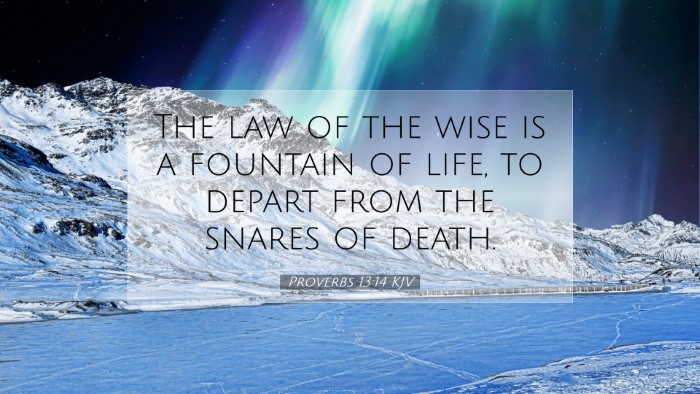Commentary on Proverbs 13:14
The verse Proverbs 13:14 states: "The law of the wise is a fountain of life, to depart from the snares of death." This verse encapsulates the essence of wisdom found in God's Word and its life-giving properties. Throughout various public domain commentaries, we uncover layers of meaning that are invaluable for pastors, students, theologians, and Bible scholars.
Understanding the Text
This Proverb speaks profoundly to the distinction between the wise and the foolish. The law of the wise refers not merely to legal prescriptions but to a comprehensive understanding of divine wisdom as it applies to daily living. The term "fountain of life" indicates that adherence to wisdom brings vitality and longevity.
Insights from Matthew Henry
Matthew Henry emphasizes that the "law of the wise" denotes both the teachings and the moral principles that guide one's life. He notes that wisdom is contrasted with folly, bringing life and deliverance from death's snares. Wisdom offers a protective boundary that keeps one from detrimental choices. Henry explains that the wise person appreciates the life-sustaining nature of these principles and seeks to embrace them fully.
Insights from Albert Barnes
Albert Barnes elaborates on the metaphor of a "fountain of life." He draws attention to the vitality that comes from wisdom, suggesting that just as a fountain provides fresh and renewing water, so does wisdom provide sustenance for the soul. Barnes argues that the wise are aware that their understanding of God's law leads them away from sin, which is depicted as a snare that leads to spiritual death. He further emphasizes that this wise conduct is not merely intellectual but results in practical living aligned with God's precepts.
Insights from Adam Clarke
Adam Clarke takes a more thematic approach by discussing the broader implications of wisdom’s protective nature. He suggests that the 'snares of death' represent various temptations and pitfalls in life that are often disguised as pleasures or advantages. Clarke describes the wise individual as someone who navigates life's complexities through discernment and careful judgment, leveraging God’s law as a guide that illuminates the path away from danger.
Practical Applications
The implications of Proverbs 13:14 extend beyond individual wisdom into the community of faith. As leaders and scholars, it's critical to recognize the following applications:
- The Importance of Teaching: Educators in faith communities must prioritize teaching the depth of God’s law, ensuring that congregants understand the life-giving power it possesses.
- Mentorship and Discipleship: Emphasizing mentor-mentee relationships can cultivate environments where wisdom is shared and applied, offering protection against life’s snares.
- Personal Reflection: Individuals must engage in regular self-reflection, assessing whether they are adhering to wisdom as articulated in Scripture or if they are straying towards folly.
Theological Significance
This verse holds theological significance as it aligns with the broader biblical narrative that centers on life, death, and redemption. The connection between wisdom and life speaks to God’s nature as a life-giver and underscores humanity’s need for divine guidance.
- Life in Christ: For Christians, the ultimate expression of wisdom is found in Jesus Christ, who embodies the law perfectly and offers eternal life.
- Understanding Death: The 'snares of death' can be linked to spiritual death, which results from sin. Recognizing this can motivate individuals to seek wisdom actively.
Conclusion
Proverbs 13:14 serves not only as a piece of wisdom literature but as a call to embrace God’s law as a life source that guards against the dangers of folly. The insights provided by Matthew Henry, Albert Barnes, and Adam Clarke illuminate this verse’s richness, enhancing understanding for those engaged in theological pursuits. It encourages both individual commitment to wisdom and communal responsibility in its dissemination.
Reflections for Leaders and Scholars
As you consider this verse, reflect on how to apply its truths within your own life and in the community you serve. How can you foster environments that prioritize God’s wisdom? In what ways can the law of the wise lead others toward life rather than death? May this exploration of Proverbs 13:14 inspire and equip you to lead with wisdom and grace.


